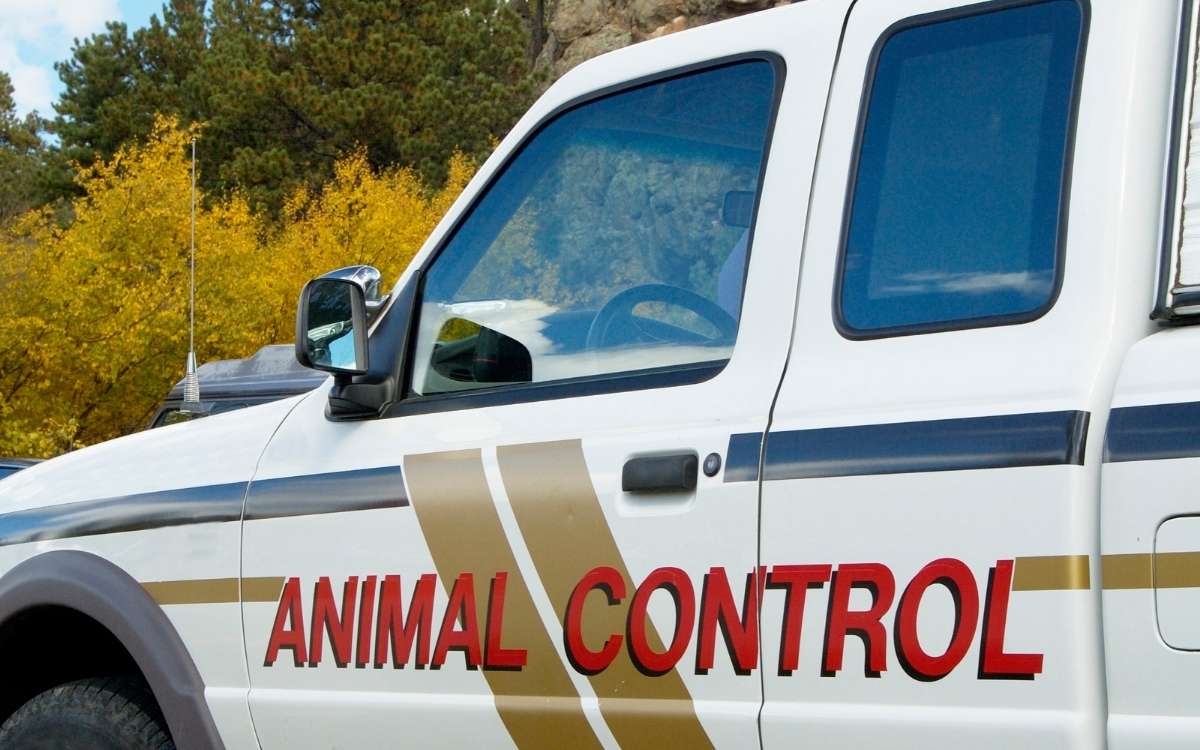
Animal control is a vital service that helps protect both people and animals in our communities.
But when is it appropriate to call animal control on a neighbor?
It’s not always as simple as you might think. Animal neglect doesn’t necessarily mean that there is violence involved, and these situations can feel highly subjective.
Furthermore, your relationship with your neighbor will inform the best course of action.
In general, it’s best to call animal control when you witness an animal in imminent danger or suffering from severe neglect. This can include animals who are left alone, deprived of food, caged for extensive periods of time, or being physically abused.
In this blog post, we will provide guidelines for determining when you should contact animal control so that you feel prepared for this challenging situation.
Table of Contents
- Things to Try Before Calling an Animal Control Officer
- When to Call Animal Control on a Neighbor
- 1. During a Time Sensitive Emergency
- 2. Their Pet Chases Your Livestock
- 3. The Animal Is in a Hot Car
- 4. There Are Signs of Severe Aggressiveness
- 5. The Animal Isn’t Getting Enough Water or Food
- 6. Your Neighbor Is Breeding Animals
- 7. You Hear Animal Noises Coming From the Neighbor’s House
- 8. There are Signs of Physical Animal Abuse
- 9. Your Neighbor’s Animal Is Constantly Escaping
- 10. The Animal is Always Outside
- 11. The Pet is Chained Up and Has No Mobility
- 12. Your Neighbor Threatens You With Their Animal
- 13. Animal Hoarding
- What Happens When You Contact Animal Control?
- How to Prove Your Case When Calling Animal Control
- When to Hold Off On Contacting Animal Control Officers
- What Are Basic Pet Rights?
- How Can I Keep My Neighbor’s Dog Out of My Yard?
- Final Thoughts
Things to Try Before Calling an Animal Control Officer
If you’re concerned about potential animal neglect or abuse, there are some things you can do before resorting to calling animal control:
1. Talk to Your Neighbor
First, try talking to your neighbor about your concerns.
It’s possible that they are not aware of the problem and would be willing to make some changes.
Try to keep things as calm and respectful as possible, and avoid accusatory language.
It’s also a good idea to have some specific examples of what you’ve witnessed so that your neighbor can understand your concerns.
If your neighbor is receptive to your conversation and willing to make some changes, great!
If you have a less-than-pleasant relationship with your neighbor, consider contacting them in writing or email.
If they don’t respond, you’ll have a paper trail.
2. Contact a Local Shelter or Rescue Center

You could also reach out to a local animal rescue or shelter for advice on how to best help the situation.
They may have experience dealing with this issue and can provide you with resources or support.
They will advise you on what is or isn’t considered animal abuse or animal cruelty so that you can make an informed decision about whether or not to contact animal control, as well as what steps to take beforehand.
3. Find a Third Party to Mediate
If you have a shared landlord, building manager, or local neighborhood association, you can also reach out to them for assistance.
A third-party mediator is often helpful in these situations.
In addition to your suspicions about the dog’s owner, this person will be able to clarify if there are any private or local ordinances that the pet’s owner is violating.
They can also serve as a witness to potential animal cruelty if you decide to pursue legal action against the neighbor.
4. Assess If You’re Contributing to the Problem
Before you take any action, it’s vital to assess your own role in the situation.
Are you feeding the animal or leaving food out that could attract their pets?
Are you creating a stressful environment that is aggravating your neighbor’s pet?
It’s possible that you’re unintentionally contributing to the problem and that your neighbor is unaware of it.
If this is the case, try to take some steps to rectify the situation before involving animal control.
When to Call Animal Control on a Neighbor
Here are some of the most common reasons to contact your local animal control service:
1. During a Time Sensitive Emergency
If you witness an animal in immediate danger, such as being hit by a car, call animal control right away.
Animals with injuries that require immediate medical attention should also be reported.
Of course, if your neighbor is there and willing to take care of the problem, you can support them.
If you’re not sure whether or not the situation constitutes an emergency, err on the side of caution and call animal control.
They will be able to assess the situation and take appropriate action.
2. Their Pet Chases Your Livestock
If you have livestock, such as chickens or goats, and your neighbor’s pet is constantly chasing them, this could result in injury or even death.
In this case, you should call animal control to have the animal removed.
Ensure you have evidence of the animal chasing your livestock, such as photos or videos.
If you have shared this information with your neighbor and they don’t resolve the incident immediately, it’s time to call animal control.
3. The Animal Is in a Hot Car
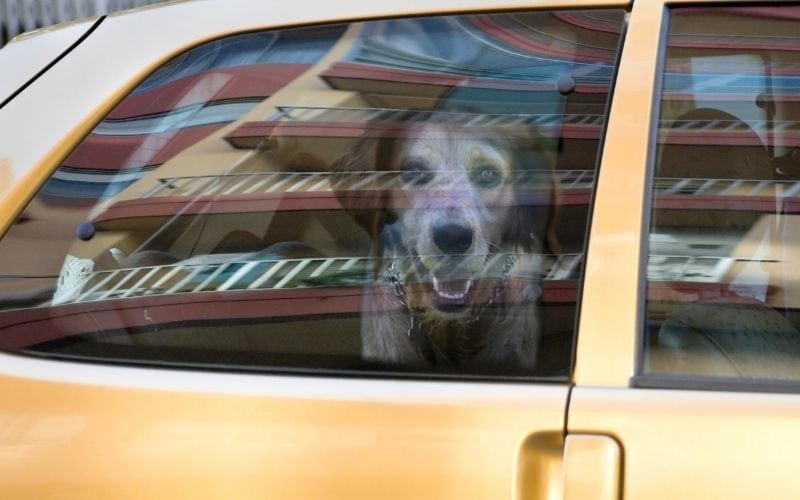
In the summer months, it’s not uncommon to see animals left in hot cars.
This is extremely dangerous and can result in heat stroke or death.
If you see an animal in a hot car, call animal control right away.
The local authorities can assess the situation and take appropriate action.
4. There Are Signs of Severe Aggressiveness
If you witness an animal acting aggressively towards people or other animals, this is a sign of severe behavior problems.
This is especially true if the animal has not been spayed or neutered.
Some signs of aggressiveness include growling, barking, lunging, baring teeth, and biting.
If you see any of these behaviors, call animal control immediately.
Severely aggressive animals are dangerous to the community and may need to be removed from the home if the pet owner won’t leash their dog.
5. The Animal Isn’t Getting Enough Water or Food

If you see an animal that doesn’t appear to be getting enough food or water, this is a case of neglect.
Some signs that an animal isn’t getting enough food include being thin, having a visible ribcage, and eating garbage.
Signs that an animal isn’t getting enough water include having dry fur, cracked paw pads, and excessive panting.
If you see any of these signs, call animal control.
They will be able to make sure that the animal is getting the food and water that they need.
6. Your Neighbor Is Breeding Animals
If your neighbor is breeding animals, this could be a sign of a commercial operation.
These types of businesses are regulated by the government and require a license.
If you suspect that your neighbor is running a commercial breeding operation, call animal control to file a complaint.
Breeding operations are firmly regulated because of the potential for animal cruelty and improper care.
7. You Hear Animal Noises Coming From the Neighbor’s House
If you hear animal noises coming from your neighbor’s house, this could be a sign of neglect or abuse.
A dog’s barking doesn’t necessarily qualify as a reason to call animal control, but repeated or unusual noises are suspect.
Some of the most common noises that indicate an issue include barking dogs, screams, and thumping sounds.
If you hear these noises on a regular basis, call animal control to file a complaint.
Try to record the noise so that you have evidence to show the authorities.
8. There are Signs of Physical Animal Abuse
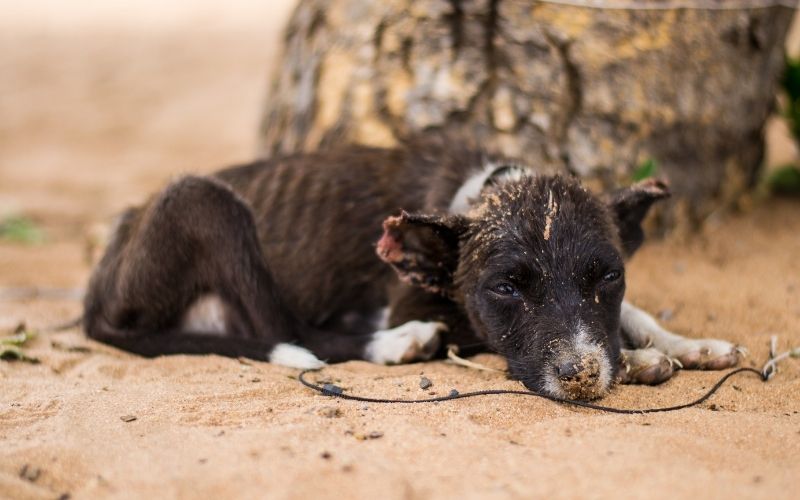
If you see signs of physical animal abuse, such as cuts, bruises, or open wounds, this is a clear case of abuse, and you should call animal control immediately.
Other signs of abuse include limping, weight loss, and fearfulness.
You may have even seen your neighbor actively strike an animal.
If you witness this abuse, don’t hesitate to call the authorities.
Some people may think that they can handle the situation themselves by confronting the abuser.
However, this is not a good idea as the abuser may become violent towards you.
Stick to calling animal control to protect yourself.
An animal control agency can investigate the abuse safely while protecting your identity from your neighbor.
9. Your Neighbor’s Animal Is Constantly Escaping
If your neighbor’s animal is constantly escaping from their yard, this could be a sign that they’re not taking proper care of their pet.
Animals that are neglected or abused are often kept in cramped and dirty conditions.
A need for food, water, or generalized anxiety may lead an animal to escape.
If you see an animal escaping frequently, call animal control.
This isn’t safe for your neighbor’s pet because stray animals, cars, and other humans are a threat to its safety.
10. The Animal is Always Outside
If you see an animal that is always outside, this could be a sign of neglect.
Animals should only be kept outside for short periods of time in weather that is appropriate.
If it’s too hot or cold outside, the animal should be brought inside.
It’s also harmful to an animal to be left in direct sunlight for extended periods of time, which could lead to heatstroke.
If you see an animal that is always outside, call animal control to make a complaint.
11. The Pet is Chained Up and Has No Mobility
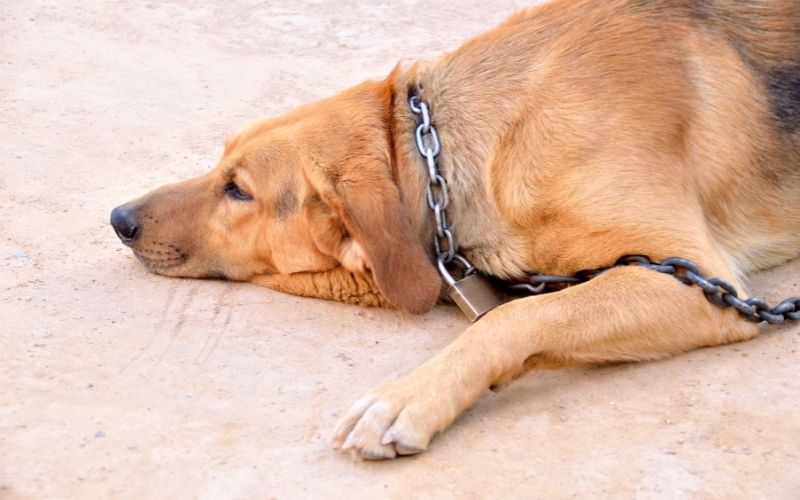
If you see a pet that is chained up and has no mobility, this is a clear case of neglect.
Animals need to be able to move around and exercise.
Chaining an animal up prevents it from being able to do this and can lead to muscle atrophy, joint problems, and other health issues.
In addition, chained animals are often left alone for long periods of time without food or water.
If you see an animal that is chained up, call animal control to make a complaint.
12. Your Neighbor Threatens You With Their Animal
If your neighbor threatens you with their animal, this is a clear case of abuse and you should call animal control immediately.
Your neighbor may be using their animal to intimidate or scare you.
This could include verbal threats or actual physical aggression from the animal.
No matter what type of threat your neighbor makes, it’s important to call animal control.
It may even be an appropriate time to directly contact law enforcement since this type of behavior is often a precursor to violence.
This will help to protect you and any other potential victims from further abuse.
13. Animal Hoarding
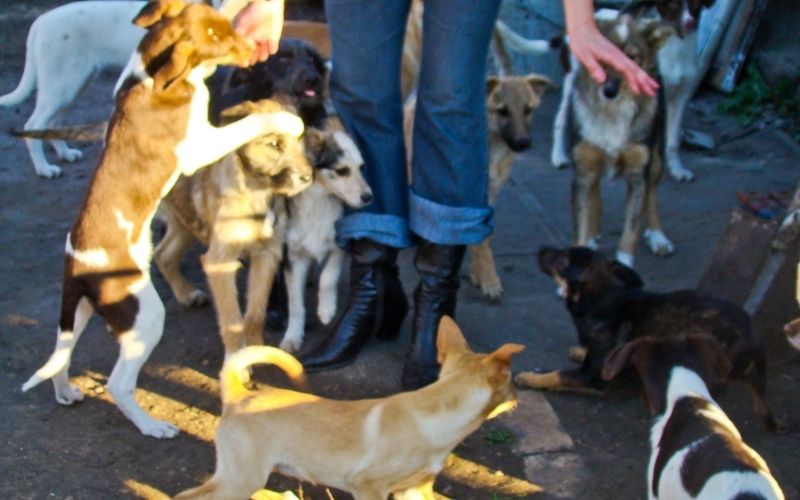
If you see signs of animal hoarding, such as a large number of animals living in unsanitary conditions, this is a serious case of neglect.
Hoarders often have more animals than they can care for and as a result, the animals are not given proper food, water, or veterinary care.
Animals that are living in these conditions may be in danger and need to be removed from the home.
If you see signs of animal hoarding, call animal control immediately.
What Happens When You Contact Animal Control?
When you contact animal control, they will do an intake with you.
They may ask for your name, address, and phone number. They will also ask for a description of the problem.
After you’ve filed a complaint, an animal control officer will contact your neighbor with a formal warning.
If the problem persists, the animal control officer will send someone to investigate.
The officer may speak with you and your neighbor. They may also look around the property to check on the animals.
If they find that the animals are being neglected or abused, they will remove them from the property.
The animal control agency may also issue citations against the owner.
In some cases, the owner may be ordered to pay a fine or serve jail time. This depends on the severity of the neglect or abuse.
How to Prove Your Case When Calling Animal Control
If you do decide to contact animal control, be sure to have all of the facts straight. This includes dates, times, and witnesses.
Animal control will not take action based on hearsay.
You can also take photos or videos of the problem. This can help prove your case.
Consider installing an outdoor camera, a Ring doorbell, or another type of surveillance system.
You can also take pictures if you see the problem happening in real-time.
If you keep all correspondence with your neighbor in writing, you will have a way to share this direct discussion with the local animal control agency.
This will prevent any miscommunication about what was said.
When to Hold Off On Contacting Animal Control Officers

There are some situations when you may want to hold off on contacting animal control.
If the problem is not severe, you may want to talk to your neighbor first.
Keep in mind that by involving a local animal control agency, you jeopardize the relationship with your neighbor as well as the well-being of the animal in question.
Ask yourself, is the disturbance really bad enough that it is interfering with your quality of life?
Does the animal in question seem to be in mental or emotional distress?
If not, there may be another path towards resolution.
Try to think of ways that you can resolve the issue without involving animal control. This could include talking to your neighbor or installing a fence.
You can also take your case to your home owner’s association to try to change the current pet policy.
What Are Basic Pet Rights?
All pets have the right to food, water, shelter, and veterinary care. They also have the right to be free from abuse and neglect.
If you see an animal that is not being given these basic rights, call animal control. You could save the animal’s life.
When in doubt, it’s always better to contact animal control. They will be able to investigate the situation and take appropriate action.
Another option is to talk to a local animal control agency or even contact the humane society.
How Can I Keep My Neighbor’s Dog Out of My Yard?
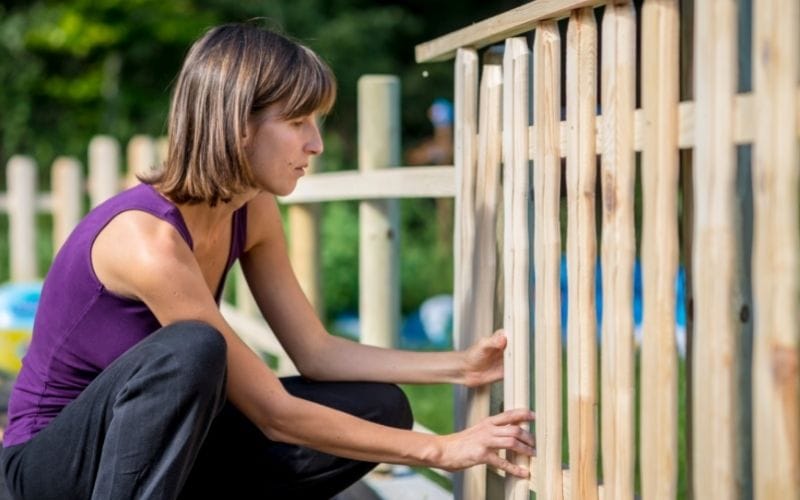
If your neighbor’s dog keeps getting into your backyard, it can be frustrating.
If you can hear the dog barking, see it tearing up your plants, or find its feces in your yard, it’s time to take action.
Here are some things you can do to limit or eliminate this behavior instead of calling animal control:
1. Put a Barrier Up
The easiest way to keep your neighbor’s dog out of your yard is to put up a fence or other type of barrier.
This will create a physical barrier that the dog cannot cross.
2. Install Motion-Activated Sprinklers
Another way to keep dogs out of your yard is to install motion-activated sprinklers or lights.
These will scare the dog away when it comes into your yard.
3. Talk to Your Neighbor
If you have a good relationship with your neighbor, you could try talking to them about the problem.
They may not even be aware that their dog is getting into your yard.
If you explain the situation and ask them to keep their dog away from your property, they may be willing to do so.
4. Install Cameras
If you want to gather evidence of the dog getting into your yard, you could install security cameras.
This will give you a record of the dog’s behavior in case you need to take further action.
Final Thoughts
It can be distressing to deal with a neighbor’s noisy or disruptive pet. In this sensitive situation, it’s important to know when it’s the right time to contact animal control officers.
The most important indicator is whether or not the animal is safe or harmed.
If the animal is threatening anyone else’s safety as well, this is also relevant.
If you’re unsure about the best course of action and can’t talk to your neighbor, don’t hesitate to contact animal control for assistance.
They will be able to help you resolve the issue professionally and humanely.
Related:
